|
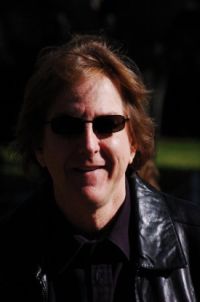 One of the best soundtracks for the audiovisual media composed this year is for the video game "Uncharted 2: Among Thieves" by Greg Edmonson. One of the best soundtracks for the audiovisual media composed this year is for the video game "Uncharted 2: Among Thieves" by Greg Edmonson.
In the interview he has kindly granted us, he details his experience in creating the score for this videogame, as well as for the first installment of this saga of high adventure.
Also well known thanks to the music written for the adventures of the Serenity’s colorful crew in the cult series “Firefly” created by Joss Whedon, Greg shows that he clearly loves his work, undertaking it with an intensity that is reflected in his energetic answers.
Ladies and Gentlemen, Greg Edmonson. :
BSOSpirit: Hello Greg. It is an honor to have the chance of making this interview. Thank you so much. Let’s begin with a very usual question, how did you start working composing music for the audio visual media?
GE: When I first moved to Los Angeles, I started working as a guitar player. I wasn't a big famous studio guy but I made a living and loved what I did. Early on I got an opportunity to write music for Hanna-Barbera. They were the big dog in the animation world at that time. They hired me because I was bringing something different to the table than all their "regular" guys. I found that I loved writing and producing the music even more than being a player. A little like the difference between being an actor as opposed to being a director. The actor gets the joy of performing but the director has more control of the project. Soon afterward, I went to work for Mike Post, who has had an amazing career in television.
At the time he had more shows than he could possibly write for and so he had a group of writers who would compose music for those shows and he would oversee the process. I worked on a number of shows for Mike (Cop Rock, L.A. Law, Quantum Leap etc). Once I moved on, I started on "King of the Hill" which was a show created by Mike Judge (of Beavis and Butthead fame). That show ended up running for 12 seasons, which makes it Methuselah in terms of television. While working on that show, I also was lucky enough to get to work on the wonderful "Firefly"---one of the great loves of my life. Following "Firefly's" untimely demise, I was fortunate enough to get to work on the "Uncharted" series with Amy Hennig and all the wonderful people at Naughty Dog (as well as the magnificent Sony music team). The "Uncharted" series has been as inspirational and as fun for me as "Firefly" - and that is saying quite a lot!
BS: You have a lot of experience in Television. Do you feel yourself comfortable with the always pretty thin deadlines the professionals of this world are committed?
GE: Well it's just a part of what we all do. If someone hires you and says, "Be done by Friday or you will never work in this town again," you will find a way to be done by Friday. It does require that you sometimes let a cue go before you would like, but finishing is goal one! The video games have a different and more elongated schedule but near the recording date it all ramps up and suddenly everyone is working day and night to get everything ready for the orchestra session. In television and film the music is always right at the end before the dub stage so the pressure is immense; the pressure in video games is to get the music done early enough to still have the time to implement it into the game in an artistic fashion.
 BS: Let’s move to talk about Firefly, one of the best crafted Sci Fi series in history. By what I know, Joss Whedon contacted you in the first place, is this right?. Did you know about his previous works for television. BS: Let’s move to talk about Firefly, one of the best crafted Sci Fi series in history. By what I know, Joss Whedon contacted you in the first place, is this right?. Did you know about his previous works for television.
GE: Well this is an unusual story. Actually every composer in Los Angeles wanted to work with Joss because of his wildly creative reputation. But Joss wasn't taking any calls from agents so there wasn't any way to get through to him. The best that anyone could do was to just send a CD of your music to the production company address - so that is what I did as well. Apparently one day Joss and some of the producers sat down and started listening to this mountain of CDs and for whatever reason they seemed to like what I sent in. They called and set up a meeting with Joss and we found that we had much in common. I liked him from the moment that I met him and I can't tell you how much I enjoyed working with him.
The reason that this story is unusual is that I got hired because of the music - there are so many other factors that enter into that decision that sometimes the actual music is way down on the list. But Joss is a pioneer in so many ways and he likes to forge his own way as opposed to taking the well-traveled road. Anyway, however it happened, I was thrilled to be working with him and my love for "Firefly" knows no bounds.
BS: Did Joss tell you why he wanted you as composer for Firefly?
GE: Not in any specific terms, but once I got to see the pilot, which was the 2-hour episode that Fox refused to air, I was so hooked. These were characters that I loved, people that I cared about. They were flawed (as we all are) but in the end they always did the right thing. And because of the show’s multi-cultural concept, the musical possibilities were exciting as well. I have always liked using ethnic instruments mixed in with the orchestra and that became something that I got to explore in "Firefly" and I have continued doing that in the "Uncharted" series as well.
BS: Did you think at that very moment that Firefly would be as good as it finally was?. Did you know that the plot would give you so many options to develop a complex, varied and rich score?
GE: I thought that "Firefly" was one of the best television shows ever made. Joss created a show
with so many wonderful characters, all of whom had such wildly divergent pasts, that you could have had story arcs for years without repeating yourself. Joss is a genius when it comes to that. All of his characters are so well-defined. For instance, "Firefly" had 4 women in the main cast, all of them are strong women but each in a different way. Not strong in some sort of comic book/superhero way but strong and vulnerable at the same time; they were real to me. I loved the scenes with Mal and Inara - he loved her but he just couldn't make himself say it. The acting was just so great that it made writing music a joy.
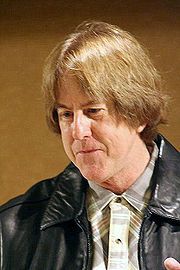 BS: Who has the excellent idea of changing radically the style of the score from the usual approach and sound in Sci Fi Tv Series like Star Trek or Stargate SG1? BS: Who has the excellent idea of changing radically the style of the score from the usual approach and sound in Sci Fi Tv Series like Star Trek or Stargate SG1?
GE: I think that we can credit Joss with the idea to do something different. In television they always say "Let's do something new" but then out of fear or pressure, they revert to the familiar in the end. Joss said it, meant it and stuck to his guns. He created a post-apocalyptic world where all the cultures were thrown together so really the music could be a lot of different things and still work. Chinese instruments could join in with western themes and still make sense. Since the original concept was somewhat similar to early American history, the shots of Serenity in space were played with dobro and fiddle rather than the standard French horn approach. It was so much fun to get to experiment with a lot of different musical instruments and it was fun for the musicians to break away from the norm as well.
BS: I guess there would be a lot of pressure about the deadlines to deliver the score for every episode on time, are we right about this? Please, tell us about the process of creation of the music in Firefly. Did you work over the script, over previous images and story boards, or over the final cut?, how much time had you to write, perform and deliver the music?.
GE: I was able to see a rough cut of each episode while it was still a work-in-progress, but I was so busy that I only started working once the picture was locked. The schedule was grueling. Usually there were about 3 or 4 days to write and record and then a day to mix the show. I would have so loved to have had a couple of more days but that is just the way that it worked out. I was working 16-hour days and every morning when I started, I never failed to remind myself, how incredibly lucky I was to be doing this show!
BS: It is surprising that a TV Series of the huge quality of Firefly were cancelled. How did you get the bad news? Were you working in an episode of the series at that moment?
GE: Well, we all knew that the show was in trouble. Fox just seemed to be killing it. This was not an 8 p.m. Friday night show. It was way too intense and adult for that time slot. I think that Fox wanted a standard action show and what they got was an action show but with a lot of interesting moral conundrums and such. So you actually had people talking to each other as opposed to non-stop mindless action. I had grown to love "Firefly" so much that when I got the news that it was definitely gone, I wept. I knew that it could not be replaced. It was like losing a beloved friend and I miss it still. As I am sure you know, I wrote the ending piece of "The Message" to say goodbye to the show.
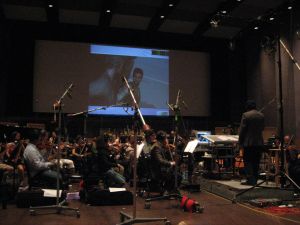 BS: Based in the information you have as composer for the series, in your personal opinion, do you think that sometime we could see again new TV adventures of these amazing characters? BS: Based in the information you have as composer for the series, in your personal opinion, do you think that sometime we could see again new TV adventures of these amazing characters?
GE: I truly don't know, but I would jump at the opportunity to work on it again. It really was a labor of love for me. Even though everyone has moved on to other projects, "Firefly" still shines and I believe that it stands as monument to excellence for all involved. As everyone has grown, it would be so much fun to regroup and do it again while bringing new skills and life experiences to the project. I know that I would approach the music in a different fashion because I have grown.
But another reason is that "Firefly" never got the chance to fully develop since only 15 episodes were made. With a new show, you start shooting in July and so when it goes on the air in September, you already have 6 or 7 episodes mostly shot. Once you see what is working for the audience, you can make small changes, but you can't go back and reshoot everything. So a show needs to run for a full year in order to really find itself. "Firefly" would have gotten so much better had it survived. What is amazing is that it was so damn good right off the bat.
BS: Varese Sarabande released a full CD with music for Firefly, did you get involved in the selection of the cues? Do you think that it would be possible in the near future to enjoy more volumes?
GE: That would seem unlikely. The soundtrack was tricky because the way that the show was structured seemed to preclude long music cues. With 9 main characters the show was always cutting to this or that "back story". So in order to make a soundtrack, cues had to be montaged together so that you could come up with a 3 or 4 minute piece. This was purely a function of the way that the show was structured. I did have some input on the cues that we used and there is much more material somewhere in the archives.
BS: We would love to talk about your work for King of the Hill. Is there any difference composing music for an animation series than for one with Live Characters?
GE: "King of the Hill" was completely different than "Firefly" but every bit as much fun to do. Obviously the tone of the show is much lighter and more comedic but the process is pretty much the same. I was really lucky because we always had a small orchestra of 25 or so to work with and that is a rarity in television now. Since you had to prepare the music for the orchestra we always had about 10 days from spotting the show until the actual recording date.
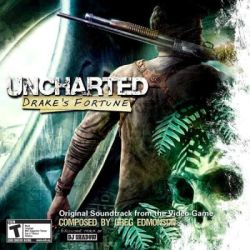 BS: What is the part of your work for King of the Hill you are more enthusiastic about? BS: What is the part of your work for King of the Hill you are more enthusiastic about?
GE: It was fun to play with all the guitar cues. I worked with a wonderful guitarist named Craig Stull and we always had fun layering guitars and finding cool guitar sounds. Of course, getting to work with an orchestra is always a joy and the players in Los Angeles are so amazing that I always consider it an honor to show up on a soundstage with them.
BS: Let’s introduce ourselves in your two compositions for the videogames world. How did you get involved with Uncharted, and consequently, how did you enter a world so close and at the same time so far of the television and cinema universe?
GE: My involvement with "Uncharted" stems from "Firefly". Naughty Dog was developing the series and was making a trailer for E3 which is a large trade show where game publishers show their latest and greatest. When they were temping music into the trailer, they seemed to like one of the cues on the "Firefly" soundtrack and so that was the beginning of a wonderful relationship with Amy Hennig and Naughty Dog.
BS: At the beginning, did you think that writing music for videogames would be as rewarding as it has finally been working for the two Uncharted installments?
GE: In all honesty, I was not sure how to approach the music when I started on the first "Uncharted". At that time many game composers were writing music that was meant to loop and I had never done that. I must say it was the support and encouragement of Amy and the Sony music team that got me up and running. They allowed me to take chances and try to do something a little different. I did try to stay away from too much melodic content in the first one. It does have themes, of course, but in the gameplay portion, it was designed to be loopable if necessary. Also the story setting was different in the first one as you were on an island so you were either enclosed in the jungle or underground in caves; a more ambient approach seemed ok.
The second one, Uncharted 2 was wide and panoramic and cried out for a bigger sound. By the time we got to Uncharted 2, I threw caution to the wind and just wrote music that seemed interesting to me without any real thought to looping. The game engines have evolved and the wonderful guys at Sony do such a good job of implementing the music into the game that I just assumed we would find a way to make it work. It still has the ability to loop but it has a lot more melodic content and is designed to cut from section to section rather than as a 3 minute brick. I can't say enough great things about the Sony team (Chuck Doud, Jonathan Mayer, Clint Bajakian, Scott Hanau, Joel Yarger and Marc Senasac). They work really hard to implement the music in such a way as to create a cinematic experience for the gamer.
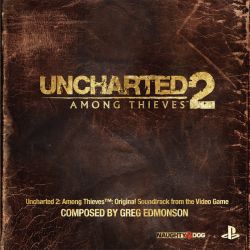 BS: Here you also break with the musical mythology for adventurers, a mythology with a profound debt to John Williams’ Indiana Jones. Did the people of Naughty Dog suggest you this change of approach, or by the contrary, it was you who wanted to disassociate of this path and create a music with clear folk roots? BS: Here you also break with the musical mythology for adventurers, a mythology with a profound debt to John Williams’ Indiana Jones. Did the people of Naughty Dog suggest you this change of approach, or by the contrary, it was you who wanted to disassociate of this path and create a music with clear folk roots?
GE: I understand why people compare "Uncharted" to Indiana Jones but I have never seen it that way. Just look at the opening scene in Uncharted 2. Nathan Drake is sitting in a railroad car looking at his hand covered in blood and realizing that he has been shot. This is much darker than Indiana Jones. To me, at least, it is more like "Firefly" and Nathan Drake's relationship with women is not unlike Mal and the women of "Firefly." So the music didn't want to be Saturday matinee style for these games. It could be bold and strong but darker and more intense.
I think that finding the right approach was probably somewhat trial and error; I would write something and then run it by Amy to see if that was what she had in mind. Amy is responsible for the writing, casting and the look of the game, essentially the same as the director on a film. She is clear about what the music should say, but she lets me try a lot of different approaches and is very open to new ideas. She is a joy to work with.
BS: Could you tell us about the recording sessions of this first part, and which musicians were involved in?
GE: Sure, we recorded both Uncharted 1 and Uncharted 2 at Skywalker Sound in San Francisco. I have forgotten how many players we had on the first one, but when you count percussion and soloists we had about an 80-piece orchestra on Uncharted 2. Skywalker is George Lucas' wonderful facility way out in the country and is a lovely place to work. The musicians are mostly from the San Francisco Symphony and the San Francisco Opera. They are great players and so easy to work with. Since we didn't use much in the way of woodwinds, our 80 guys make a pretty big sound - lots of brass and strings.
For our soloists we had Chris Bleth, who is the most astonishing player you will ever meet. He plays all of the legit woodwinds as though they were his primary instrument and he also is a star on all of the ethnic woodwinds such as dizi, duduk, ney etc. He is all over both Uncharted 1 and Uncharted 2. This time we were fortunate enough to have Karen Han play the erhu for us. The erhu is a primitive Chinese violin which only has 2 strings. She is such an amazing talent. Since we were in Tibet (in the game) we got to use the erhu and big temple horns. Craig Stull played the saz, a primitive guitar-like instrument.
BS: Had you got much time to compose and record the soundtrack?
GE: On Uncharted 1 I came in fairly late and I had to really push to get done before the orchestra session. I can't remember exactly, I had a couple of months or a little more to write an hour plus of music. On Uncharted 2, I started earlier but the schedule was more elongated so I didn't need to crunch every day. But once you start to get close to the orchestra date it is always crunch time -that's where you pay for your procrastination!
We divide the recording into 2 separate trips. On trip one we record all the music that will go into the gameplay portions. This gives the Sony team time to mix and then start to put the music into the game. They need time to do the creative things that they do. On the second trip we record the music that will go into the cinematic/cut scenes. This is a little more like TV/film. The music will just drop in and be mixed with the dialogue and FX.
 The way that we record is having all the players on the stage at the same time. We rehearse, and then we record the strings and horns in separate passes. Sometimes we will break it down even further, like just the marcato strings etc. This is a little different than some guys. Some projects only have the strings come in one day and only horns the next. But my wonderful orchestrators (Alan Steinberger and Eric Schmidt) and I feel strongly that it is beneficial to have everyone at the same time so that they all know exactly what the other sections are doing; you just have to move a little faster, as you have more people on the clock. For trip one, we worked for 3 days and then came back to Los Angeles and recorded percussion (Brad Dutz & Brian Kilgore) at Village Recorders for 3 more days. Trip two was a one-day recording session. Since the music for the cinematics is just like a film cue, you can just record everyone at the same time. The way that we record is having all the players on the stage at the same time. We rehearse, and then we record the strings and horns in separate passes. Sometimes we will break it down even further, like just the marcato strings etc. This is a little different than some guys. Some projects only have the strings come in one day and only horns the next. But my wonderful orchestrators (Alan Steinberger and Eric Schmidt) and I feel strongly that it is beneficial to have everyone at the same time so that they all know exactly what the other sections are doing; you just have to move a little faster, as you have more people on the clock. For trip one, we worked for 3 days and then came back to Los Angeles and recorded percussion (Brad Dutz & Brian Kilgore) at Village Recorders for 3 more days. Trip two was a one-day recording session. Since the music for the cinematics is just like a film cue, you can just record everyone at the same time.
BS: Did you face any unexpected challenges being this your first score for a videogame?
GE: Well I certainly had to find my way when I first started on Uncharted 1 but by the time we got going I felt confident. By the time we finished and I got to see how the Sony team was using the music I had learned a lot. On Uncharted 2, I was able to bring that experience with me and just picked up where I left off. Plus games are changing very fast as newer technology becomes available so when we started on Uncharted 2, I wrote music that seemed appropriate and didn't give much thought to the looping. I just made the music in sections so that the Sony team could use the game engine to cut to another section rather than endless repetition.
BS: It seemed difficult to improve the achievements of the first part, but with Uncharted 2, there is no doubt you expanded the results. Which were the most important factors to get this?, maybe the experience?, or a story that you founded more motivational than the first one?
GE: Yes the experience helped a lot but there were a lot of factors in play. Amy Hennig wrote a real story and cast it with really good actors. The story had characters that you cared about and scenes with emotion and depth. This makes writing music fun. Plus Amy and Jonathan Mayer allowed me to write emotional music without knowing how it would fit into the game. One of the big differences between film/TV and video games is that the video game is always a work-in-progress whereas the film is a final cut. Games are ever changing right up until the day that you have to deliver. Every single day there are new layers added, or the lighting changes etc.
So sometimes I might write a piece for a certain place in the game but when all is said and done another piece might work better which is why this whole video game world is a wonderful team effort and you must work with people that can make the right musical decisions. Amy and Jonathan encouraged me to just write music and we didn't always know where it would go. One of the erhu themes ended up in the scene where (spoiler alert?) Schafer dies and again at the end when we think that Elena might die. But it wasn't written specifically for those scenes. I am so incredibly lucky to be working with people who let me take those chances.
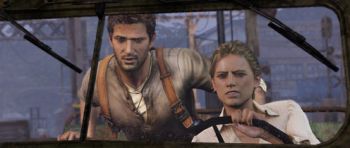 BS: Uncharted 2: Among Thieves shines through a great thematic variety. I think you don’t stop creating leitmotifs, next better than the previous one. Is it difficult for you to compose leitmotifs, or by the contrary, that is the easiest part? BS: Uncharted 2: Among Thieves shines through a great thematic variety. I think you don’t stop creating leitmotifs, next better than the previous one. Is it difficult for you to compose leitmotifs, or by the contrary, that is the easiest part?
GE: I don't know, I just try to keep it interesting. Amy and Jonathan are great because they just tell me, we need more of this, or let's do a medium intensity piece next and I just sort of do the task at hand. Because I wasn't afraid of melody in Uncharted 2, I was much more comfortable and felt like I was doing a better job of serving the story.
BS: The commercial release of this second installment has been waited for a long time, but finally here it is thanks to Sumthing Else Music Works. Did you get involved in the selection of cues?
GE: Mostly Sony handles that task. They always ask me for input but it really is a team effort. They did have one rule which was to not group all the action pieces together - that works for me as well.
BS: Can we expect the release of the first Uncharted in CD?
GE: I suspect not, I think that we will most likely just keep moving forward at this point, but you never know.
BS: Although with Firefly you got admiration and professional recognition, with Uncharted I think you have given a further step. All the awards got by your masterful score for Uncharted 2 are proof enough. Do you think that composing for videogames is your place, or you want to be just involved with Uncharted and going on with TV and Cinema?
GE: I know that I will continue to work with Amy, Naughty Dog and Sony as long as they will have me. It just doesn't get any better for a guy in my position. I do love having the resources of a large orchestra which you could never have in TV. Actually I just love writing music and working with picture so if the phone rings then I am interested. Would I love to do a really good film? You bet. But I am so lucky to be doing what I am doing right now and my life is complete. I get to write music and work with people that I like and admire - how fortunate is that!
BS: Could you tell us some inside view or some funny momentum about composing one of your scores.
GE: Well there is one thing that I have learned about ethnic instruments, it helps tremendously if you can actually "see" the instrument being played. They sometimes look so strange and exotic and somehow the look of the instrument helps you to hear it a certain way. Take the visual away and on a recording it just sounds like "doink." The good news is that this allows them to be interchangeable as no one can really tell a Chinese "doink" from a Turkish "doink" so you can usually mix and match. This is helpful because most ethnic instruments have limited range and playability, especially to studio players who don't play them every day. Since all cultures seem to invent their own drums, woodwinds and stringed instruments, it is fun to mix them all in!
BS: Could you speak to us about some future project?
GE: Right now I am finishing up a little film called "Montana Amazon." It is a very black comedy starring Olympia Dukakis and Haley Joel Osment. This film is the polar opposite of Uncharted 2, so I am getting plenty of variety. I did my first project for Disney last year so there might be something in that direction as well.
BS: Thanks so much Greg, it has been a real pleasure.
GE: Thank you for having me!
Interview by David Doncel, David Sáiz and Asier G. Senarriaga.
|





